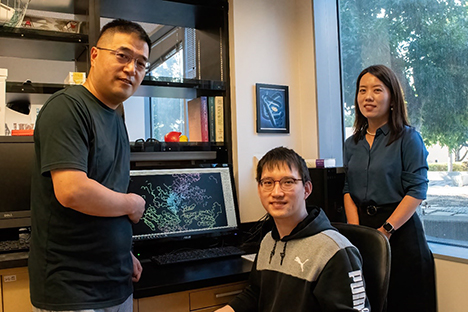Engineering-Plus Collaboration with Medicine Aimed to Enhance Biomanufacturing

Oct. 5. 2023 - The U.S. Department of Energy (DOE) Bioenergy Technologies Office and the National Science Foundation (NSF) have selected a joint project between the UCI Samueli School of Engineering and School of Medicine, UC Davis and Argonne National Laboratory researchers to receive $1.5 million in funding over the next three years to accelerate biomanufacturing innovation.
Biotechnology and biomanufacturing provide unique opportunities to delve further into the climate change issues that the country is facing as well as grow the U.S. bioeconomy and advance the fields of science and engineering.
The team's project will receive support under the funding opportunity: Accelerating Innovations in Biomanufacturing Approaches through Collaboration Between NSF and the DOE BETO-funded Agile BioFoundry (ABF).
“The U.S. has set aggressive decarbonization goals for 2030 and beyond,” said Valerie Sarisky-Reed, BETO director, in the DOE/NSF announcement. “These award recipients will leverage ABF’s rapid prototyping and advanced biotechnology resources to accelerate basic research projects to deployment, reducing America’s dependence on fossil fuels and lowering greenhouse gas emissions from fuel and chemical production.”
Han Li, an associate professor in chemical and biochemical engineering with a joint appointment in biological chemistry, is principal investigator, and Feng Qiao, professor in biological chemistry, is the co-PI. They will collaborate with Justin Siegel, at UC Davis and Philip D. Liable, at Argonne National Laboratory on the project.
The team will work together to enhance the carbon and energy efficiency of a biomanufacturing process by upgrading carboxylic acids into precursors for biofuels and chemicals used in industry. The goal is to create a more efficient process for carboxylic acid reduction that does not release any carbon into the atmosphere.
"We are very honored to receive this award," said Li. "The unique combination of expertise between the schools of engineering and medicine at UCI, along with other team members, will allow us to bring fundamental research all the way to industrially applicable biomanufacturing processes that can make an impact in the areas of renewable energy and sustainability."
The researchers also intend to identify the principles necessary to enhance efficiency in the enzymes used in the process. Through outreach efforts, they will provide hands-on exposure to STEM fields for largely Hispanic populations and women, both groups underrepresented in science and engineering.
“The exceptionally collaborative and interactive research environment at UCI enables us to respond to rare funding opportunities like this one, rapidly and competently,” said Qiao.
Michelle Strombeck / UCI School of Medicine
